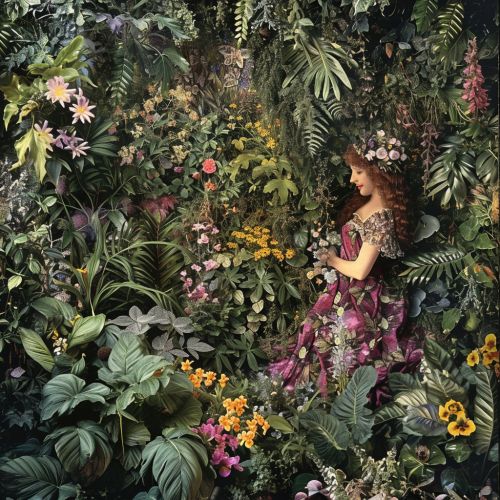Flora (mythology)
Origins and Characteristics
Flora, in Roman mythological tradition, is the goddess of flowers, vegetation, and fertility. Her name, derived from the Latin word "flos" meaning flower, reflects her association with the blooming of plants during springtime. Flora was considered one of the minor deities but played a significant role in the daily life and religious practices of the ancient Romans.


Flora's Greek counterpart is Chloris, who, according to the myth recounted by Ovid in his Metamorphoses, was a nymph transformed into Flora by Zephyrus, the west wind. The Romans, however, regarded Flora as an ancient Italic deity and she was one of the fifteen deities who had their own flamen, the Flamen Floralis, a high priest who served her.
Worship and Festivals
The worship of Flora was widespread in ancient Rome. She had a temple in Rome near the Circus Maximus, which was said to have been founded by the Sabine king Titus Tatius in the 8th century BC. The temple was the site of the annual Floralia, a festival held in her honor.
The Floralia was a six-day festival starting from April 28 to May 3, celebrating the renewal of the cycle of life, drinking, and flowers. The festival included ludi circenses (circus games), theatrical performances, and a sacrifice to Flora in her temple. During the Floralia, Romans would wear colorful clothing instead of the usual white, and offerings of milk and honey were made to the goddess.
Iconography
In art, Flora is usually depicted as a beautiful maiden, adorned with flowers. She is often shown in the company of other deities associated with spring and growth, such as Ceres, the goddess of agriculture, and Venus, the goddess of love and beauty. In some depictions, she is shown scattering flowers, a direct representation of her role as the bringer of spring.
Influence and Legacy
Flora's influence extends beyond mythology and has left a lasting legacy in our language and culture. The scientific term 'flora' used to denote the plant life of a region was derived from her name. The character of Flora has also appeared in various forms of art and literature, from Roman frescoes and sculptures to Renaissance paintings and poetry.
